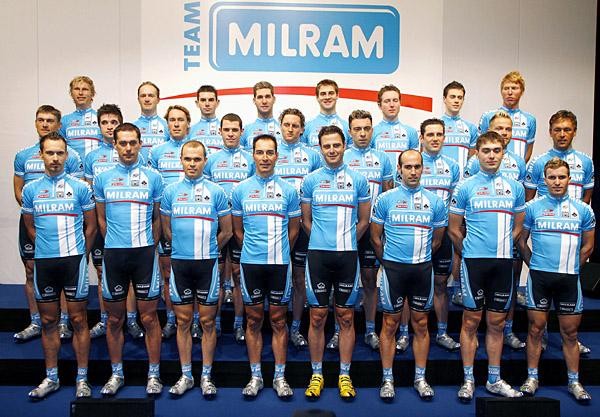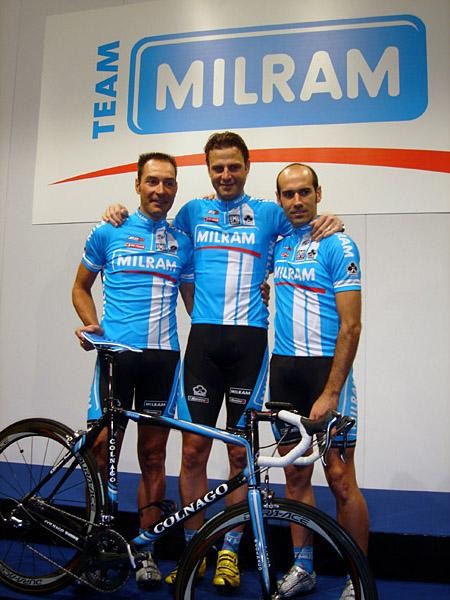Milram doesn't "have to win every race"
By Susan Westemeyer "We don't have to win every race," says Team Milram general manager Guinluigi...


By Susan Westemeyer
"We don't have to win every race," says Team Milram general manager Guinluigi Stanga. "But when we do win, it will be cleanly and honestly." Sprinter Erik Zabel was at first surprised by the new philosophy, but, he said with a grin, "You do what the manager says."
The "Don't-win-at-all-costs" theory was put forth at the team's presentation Wednesday in Bremen, Germany. It will help take some pressure off the riders. "Sometimes second, third or fourth is all you can do, but you can be satisfied with that, too," noted Zabel.
Stanga says that he is "very proud" to work for this "young team, clean team." He is looking forward to better things in the team's second year. "We had some successes, some wins. We have a good team that will bring in victories over the whole season."
Last year the team tried out a two-pronged attack with Alessandro Petacchi and Erik Zabel, which was cut short by the Italian's injuries. This year the team is going one number better and has added a third prong, former world champion Igor Astarloa. The quiet-spoken Spaniard is the man for the Spring Classics with "difficult finishes" (as Zabel put it), such as Amstel Gold or LBL. Astarloa said he was accepted "with open arms" by his new teammates and is looking forward to working with his fellow "stars" -- the term the team uses to describe him, Petacchi, and Zabel. "I know the two are good sprinters," Astarloa said in a masterful understatement. "I will concentrate on the Classics, but the most important thing is to get good results for the team."
Zabel, "the most successful active cyclist in the world", doesn't foresee leadership problems for the coming season. "I assume it will work out as well as in 2006," he said, emphasizing the "mutual respect" between himself and Petacchi.
The Italian also anticipates no problems, and explained how easy it is, in fact, to determine for whom the team will prepare a sprint. "Usually near the finish we talk to each other about who is going better, Erik or me. We're both professionals, we can help each other and have no problem with that."
Get The Leadout Newsletter
The latest race content, interviews, features, reviews and expert buying guides, direct to your inbox!
But it makes a difference to the team as to who will go for the sprint, because it prepares differently for the two riders. "For Alessandro we ride a longer sprint. Erik likes a shorter sprint," according to Marco Velo. "Erik has never had a team like us before -- we have shown him how it can be when the whole team works for him."
Helping in the lead-outs for Petacchi and Zabel will be new recuit, two-time world track champion, reigning Olympic team pursuit champion and one of the TP world record-holders, Australian Brett Lancaster, who upstaged all the Italian speedsters when he won the prologue in the 2005 Giro d'Italia while with Ceramiche-Panaria.
The team lays great worth not only on its three stars, but also on its youngsters, such as newcomer Marcel Sieberg, 24, a man for the "rainy" Belgian races, or Christian Knees. The 26-year-old not only won Rund um Köln last year, but also placed well in the ninth stage of the Tour de France, an experience which, he said, "inspires me for this year. I have seen that is possible to win a Tour stage, and that is now my major goal for this year."
The biggest theme in cycling these days is doping, but Milram is not jumping on the "Anti-doping program" bandwagon. "We're not doing anything special," Stanga said. "There are institutions to deal with that sort of thing." Instead, he will appeal to the riders' sense of honesty and honor. "We try to instill in our riders what our position on doping is. We must present an honest team. I think you can fight doping better by talking to the athletes, so that they understand that wins must be honorably achieved."
In order to promote its goals of communication and development, the team has instituted a new structure in a roughly pyramidal form. At the bottom are the "young and wild ones," topped by the more experienced all rounds, the whole thing topped off by the stars.
This pyramid is to be tended by the three sports directors, Vittorio Algeri, Antonio Bevilacqua, and Oscar Pelllicoli. Each will be assigned nine riders, with whom they will stay in close contact throughout the season. Or, as the team press release put it, "so that they can better monitor the development potential of each individual rider and, if possible, enable the rider to move up to the next level."
Stanga is looking for better results n 2006, noting that "we had no major wins last year but we were on the podium on 90 occasions." The team "depends on Erik Zabel and Alessandro Petacchi. We think these two athletes have earned our trust." More specifically, he said, the team's goals will be the same as last year -- Milan-San Remo, the race in Hamburg, -- and we'll try for good results in the Giro, Tour, and Vuelta." Plus "a special consideration for the World Championships in Stuttgart."
Commercial manager Gerry van Gerwen said proudly that the team "has the image of a gentleman's team -- a good image and a beautiful image." He summed up the team's philosophy for the coming season by saying, "The process is more important than the result. Of course we intend to pursue our objectives more consistently using this system in the future, but we also want to offer more and better support to the individual riders in terms of their development."
Please see the Teams Database for the full Milram roster.